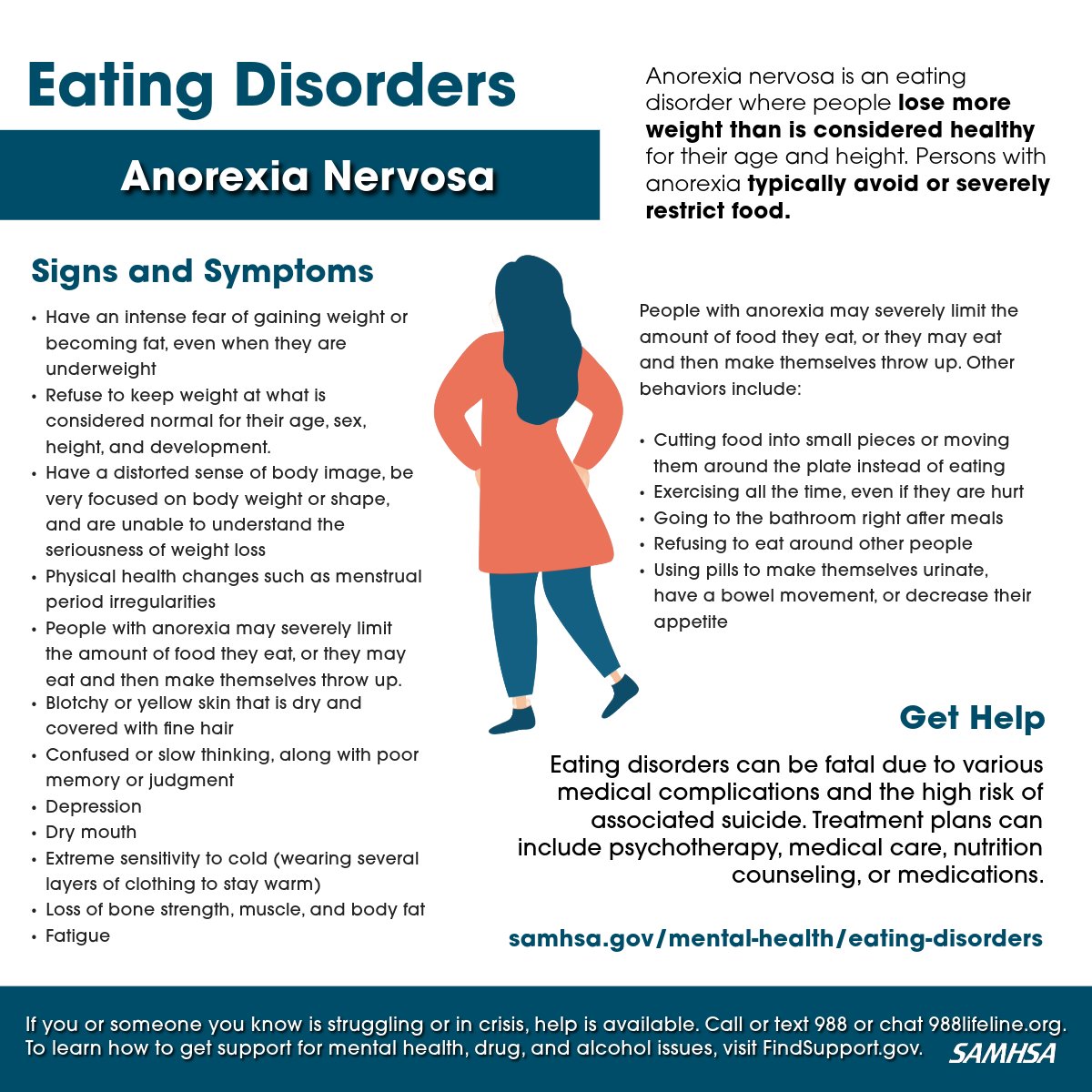Anorexia nervosa
Anorexia means a loss of appetite and inability to eat, often due to a physical illness, anorexia nervosa. Anorexia nervosa is when a person intentionally restricts their food intake.
Federal government websites often end in. Before sharing sensitive information, make sure you're on a federal government site. The site is secure. NCBI Bookshelf. Christine A. Moore ; Brooke R.
Anorexia nervosa
Anorexia nervosa AN , often referred to simply as anorexia , [12] is an eating disorder characterized by food restriction , body image disturbance , fear of gaining weight, and an overpowering desire to be thin. Individuals with anorexia nervosa have a fear of being overweight or being seen as such, despite the fact that they are typically underweight. The causes of anorexia are varied and may differ from individual to individual. Treatment of anorexia involves restoring the patient back to a healthy weight, treating their underlying psychological problems, and addressing behaviors that promote the problem. It is estimated to occur in 0. Anorexia nervosa is an eating disorder characterized by attempts to lose weight by way of starvation. A person with anorexia nervosa may exhibit a number of signs and symptoms, the type and severity of which may vary and be present but not readily apparent. Anorexia nervosa, and the associated malnutrition that results from self-imposed starvation, can cause complications in every major organ system in the body. Signs and symptoms may be classified in physical, cognitive, affective, behavioral and perceptual:. Interoception involves the conscious and unconscious sense of the internal state of the body, and it has an important role in homeostasis and regulation of emotions.
Structural neuroimaging studies have found global reductions in both gray matter and white matter, as well as increased cerebrospinal fluid volumes. Etiology The success of many professions depends on a person's weight. With adequate refeeding and the full restoration of both fat mass anorexia nervosa fat-free mass, anorexia nervosa, hunger eventually becomes normalized.
Anorexia or anorexia nervosa is a serious mental illness that can cause individuals to limit how much they eat or drink. Anorexia can affect anyone of any age, gender, ethnicity or background. In some cases, anorexia nervosa can be characterized by low body weight, however you can never tell how unwell someone is by just considering their weight. As well as limiting how much they eat, they may do lots of exercise, make themselves sick, or misuse laxatives to get rid of food eaten. Some people with anorexia may experience cycles of bingeing eating large amounts of food at once and then purging. Whether you need emotional support, want to connect with others or to learn new skills, our range of support services can help. This can lead to them checking their body regularly and weighing themselves or avoiding scales and mirrors.
If your doctor suspects that you have anorexia nervosa, he or she will typically do several tests and exams to help pinpoint a diagnosis, rule out medical causes for the weight loss, and check for any related complications. Your mental health professional also may use the diagnostic criteria for anorexia in the Diagnostic and Statistical Manual of Mental Disorders DSM-5 , published by the American Psychiatric Association. Treatment for anorexia is generally done using a team approach, which includes doctors, mental health professionals and dietitians, all with experience in eating disorders. Ongoing therapy and nutrition education are highly important to continued recovery. If your life is in immediate danger, you may need treatment in a hospital emergency room for such issues as a heart rhythm disturbance, dehydration, electrolyte imbalances or a psychiatric emergency.
Anorexia nervosa
Eating disorders are serious health conditions that affect both your physical and mental health. These conditions include problems in how you think about food, eating, weight and shape, and in your eating behaviors. These symptoms can affect your health, your emotions and your ability to function in important areas of life.
Shabbat times
Visit HelpFinder. Explore careers. Here is how to find the right treatment. Check out these best-sellers and special offers on books and newsletters from Mayo Clinic Press. New York: McGraw Hill. Hales RE, et al. Postgraduate Medicine. Hope with Eating Disorders. The spread of Western media, fashion, and lifestyle ideals across the globe has begun to shift perceptions and standards of beauty in diverse cultures, contributing to a rise in the incidence of anorexia in places they were once rare in. Boca Raton, FL: Routledge. Anorexia Nervosa Christine A. Pathophysiology Studies demonstrate biological factors play a role in the development of anorexia nervosa in addition to environmental factors. Royal College of Psychiatrists. Eating Disorders. If you think you may have anorexia, even if you're not sure, see a GP as soon as you can.
Anorexia nervosa AN , often referred to simply as anorexia , [12] is an eating disorder characterized by food restriction , body image disturbance , fear of gaining weight, and an overpowering desire to be thin. Individuals with anorexia nervosa have a fear of being overweight or being seen as such, despite the fact that they are typically underweight.
Springer Berlin Heidelberg. The Regents of The University of California. National Collaborating Centre for Mental Health. Patients involved in treatment sometimes felt that treatment focused on biological aspects of body weight and eating behaviour change rather than their perceptions or emotional state. Accessed Nov. Psychological signs include:. S2CID Arlington, Va. However, prospective studies are still scarce and the results from current literature regarding causal connections between AN and personality are unavailable. Complications can affect every bodily system, and they can be severe. Davis H, et al. People who have anorexia try to keep their weight as low as possible.


0 thoughts on “Anorexia nervosa”